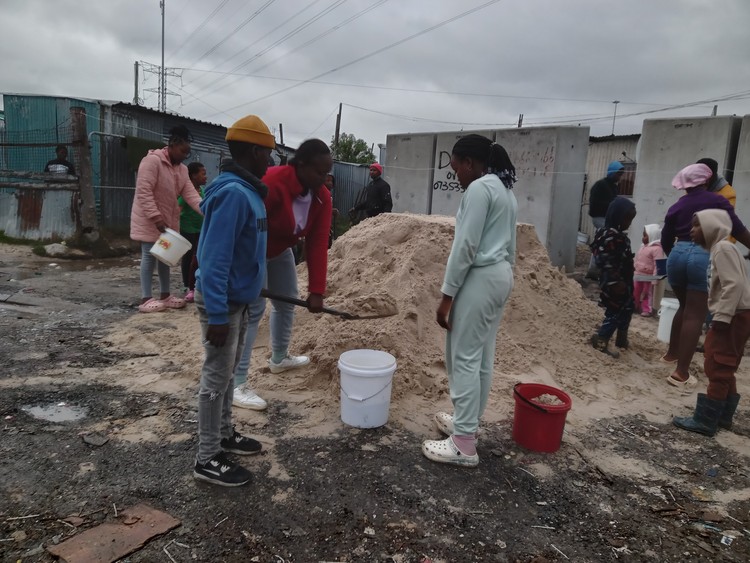
16 July 2024
Residents of Siqalo informal settlement near Mitchells Plain collect sand that had been donated to the area to help secure their shacks and mitigate further flooding. Photo: Sandiso Phaliso
Families living in informal settlements across Cape Town took advantage of the break in heavy rainfall on Monday to repair any damage caused by flooding and strong winds last week.
We visited Siqalo informal settlement near Mitchells Plain and found several residents securing zinc sheets on roofs and shovelling sand to create a flood break around their shacks.
Masithembe Lothe said she was among the many Siqalo residents who was forced to leave her home when heavy rains caused ankle deep flooding in her home.
She said she spent much time trying to scoop water out of her home with buckets. Furniture and electrical appliances were damaged, and some groceries, clothes and bedding were soaked and ruined, she said.
Her four children have not been at school for a week now.
“It is a mess. We don’t know how we are going to get through this disaster. This heavy rainfall has had damaging effects. If we continue living in shacks with no proper infrastructure, this will happen every time it rains.
“We deserve proper houses and drainage systems,” said Lothe.
Another resident Lulamile Thembani said a truck full of sand was delivered to the informal settlement on Monday, but it was not enough for everyone. Thembani noted that the sand was only a temporary measure and wouldn’t be useful in severe flooding.
“Community halls nearby were supposed to be activated…This has been declared a disaster, but nothing has happened to help us. All the politicians care about is our votes, nothing more,” he said.
More than 100,000 people have so far been affected, and 33,000 structures were damaged in Cape Town alone, said Anton Bredell, Western Cape MEC for Local Government, Environmental Affairs and Development Planning in a recent statement. The Western Cape has been classified a disaster by the national government, following a request to do so by Bredell.
Charlotte Powell, of the City of Cape Town’s Disaster Risk Management, said that BM section and Ward 99 in Khayelitsha, both informal settlements, as well as parts of Masiphumelele and Zwezwe in Dunoon were among the hardest hit.
She said there are pockets across the city that have been affected including in Gugulethu, Philippi, Imizamo Yethu and Mfuleni. “Wherever there’s an informal settlement in a low-lying area, it will be affected by flooding,” she said.
Powell said their disaster management officers’ safety takes priority when they get emergency callouts late at night or early in the morning. “In areas that are volatile, they’ll respond at first light.
“Burst water mains take priority because we don’t want people to be without water for long periods. Power lines and roadways are also a priority,” she said.
Powell commended disaster management workers who have been outside on the ground during the heavy rains and disruptive winds. “Their weekends have also been taken from them. They work until late at night and have to start again in the early morning hours. Our disaster management officers have had a long run this past week,” she said.
The City of Cape Town’s disaster risk management centre in Goodwood was a hive of activity during the recent strong wind and heavy rain. Photo: Marecia Damons